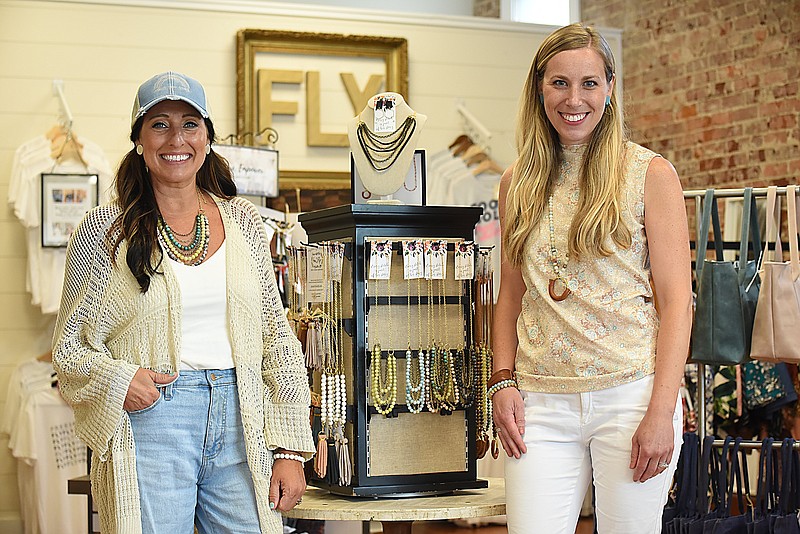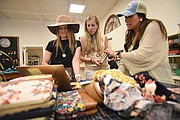The storefront at the corner of North Ocoee Street and Central Avenue in downtown Cleveland, Tennessee, is part of an emerging boutique district. On a city block tucked between the Bradley County Courthouse and Lee University, the white, two-story building is home to a nonprofit called Project Free 2 Fly which helps women transition from rehab and/or homelessness to more stable lives through job training and life skills counseling.
Through its big display windows, the Free 2 Fly retail store beckons customers with racks filled with trendy, handmade purses and handbags, casual clothing, and jewelry crafted from leather and beads. It's the kind of place where moms and their daughters visit on Saturdays, and where downtown workers scurry to browse on their lunch breaks.
There's a 1960s vibe to the merchandise. The style of the products is vaguely Bohemian, but also feminine. Bo-SHE-mian?
Old-timers in Cleveland remember the building as a long-ago department store, but in more recent years it was used by a previous owner to warehouse ductwork and fixtures for other properties.
Just inside the front door hangs a framed jigsaw puzzle made from a photograph of the exterior of the building. The all-white exterior surfaces and same-sized windows in the facade make it an especially hard puzzle to put together, people say. Like a lot of things about Free 2 Fly, it's harder than it looks.
___
Here's something to know about 51-year-old Tonie Roberson of Blue Ridge, Georgia: For about 20 years, she didn't have a driver's license. Alcohol was her nemesis, she says, and her life was on a downward spiral when she finally got help from Women of Hope Ministries, a rehab facility in Charleston, Tennessee.
"It was bad," Roberson says of her condition when she went to rehab. "I had reached a place in my life where I had pushed everyone away. I was very isolated, lonely, depressed and hopeless. I spiraled into my addiction. It's a dark place to be when each day feels the same and the drinking gets worse and worse."
Like a lot of people emerging from rehab, Roberson wasn't sure how to transform her newfound sobriety into success in the world of work. It's a common problem, recovery experts say. Transitioning from the protective cocoon of rehab into the unforgiving world of work can unravel the fragile gains of addiction recovery.
When you are trying to regain your footing in life, little things matter. Little things like driver's licenses, and high school diplomas, and work references, and job skills. That's the space Free 2 Fly tries to bridge, transitioning women from rehab facilities and shelters into sustainable jobs and housing. Each "graduate" must work through a checklist of basics like gaining transportation and finding a place to live. It typically takes about 12-18 months.
For Roberson, who will graduate this month, the formula worked. Through 14 months of hard work, she mastered the industrial sewing machines that constitute the assembly line for the Free 2 Fly product line, earning about $10 an hour over 30-hour workweeks while also completing life skills classes that are part of the program.
Importantly, she also regained her driver's license, which is key to her independence. She paid off a used car in four months and moved into a basement apartment in Harrison, Tennessee. After graduating from Free 2 Fly, she will begin a paid internship with the nonprofit later this summer.
"It's been a good program for me," she says. "The women are so encouraging. I have been able to stay focused and reach my goals."
___
Chattanooga native Hailey Johnston is a former work-at-home mom and dance teacher who is the visionary behind Free 2 Fly. The 501(c)(3) agency has helped about 40 women get back on their feet since she founded it in 2015.
Johnston, who now serves as CEO, would say she is merely channeling a faith-inspired calling to help women in crisis. The origin story of Free 2 Fly goes back almost a decade when Johnston was home with two young daughters, trying to piece together a supplemental income for her family by sewing children's clothes for sale.
Her side hustle veered in a new direction when she and her husband, Steven, who works for Baptist Collegiate Ministries, hosted a mother and her children through Family Promise, an agency that helps families transition out of homelessness. Hailey says she was led spiritually to put two-and-two together, to blend her sewing business with her heart to help women.
"That's the first time God put a face to the idea," she says of the Family Promise hosting experience. "I knew that through partnering with other organizations in the community we could identify the women that we would serve through this whole idea of sewing, (while) creating work and life enrichment and a support system for women."
By 2014, Johnston was putting together a board of directors, organizing fundraisers and finding office space to put walls around her vision. An attorney friend helped with the paperwork for quickly gaining 501(c)(3) status. A craft market called Bird & Barn was conceived to help raise money for the fledgling group. Meanwhile, a "launch event" in downtown Cleveland showed that the idea of Free 2 Fly had traction in the community.
"We had made some products: bags and handbags. And people showed up," Johnston recalls of the launch event. "It was very successful. It was new, creative. There was nothing like this model. People were intrigued and excited. It helped fuel our fire."
Johnston, who is self-taught at sewing, had previously used interns from Lee University to help make her handmade clothes. But she realized that to scale up the enterprise and pay this new class of employees, Free 2 Fly needed a creative jolt.
Help arrived in 2015 - and not just a spark, but a lightning bolt.
___
Joanna Ivey, also a work-at-home mother of two, had caught the Etsy.com wave in the mid-2000s, selling handmade items online and eventually turning a meaningful profit. She is especially good at designing and making purses.
"I was tired of shopping for purses at Target," she says of her early forays into sewing. "I put a (handmade) purse on Etsy and it sold in two days."
Before long, Ivey was marketing her leather goods through Etsy and Facebook while also working craft fairs and hosting home-based "parties" to sell her goods. When mutual friends suggested that Johnston reach out to Ivey, Ivey thought Johnston just wanted some advice. It turns out the Free 2 Fly founder had something more substantial in mind.
In 2015, Ivey became Project Free 2 Fly's first full-time employee. As creative director, she took the lead in designing products for the nonprofit to sell through its growing online and brick-and-mortar businesses. Because cash flow from merchandise sales - along with fundraising proceeds and donations - is crucial to the nonprofit, Ivey's designs have to anticipate fashion trends. People say she has an intuitive sense for being ahead of the style curve.
Too, a big part of her job is training the workers to operate the sewing machines that are crucial to the operation. Teaching women to not be intimidated by the machines almost becomes a metaphor for life, she says. Talk in the sewing room often drifts to life's problems, she says, and the physical work of making bags and accessories becomes therapeutic.
"Everybody has trauma and pain and brokenness," Ivey says. "It just looks a little different in each of us."
Ivey says she pushes the women to work through their fears of the sewing machines, and of life in general.
"I tell them, 'Look, you have to boss it,'" she says of the machines. "I tell them, 'You are at a crossroads. You have to put in the work.'"
Ironically, the goal of Project Free 2 Fly - to graduate women into the wider work world - is sometimes at cross-currents with the business side of the operation, which aims to produce quality salable merchandise. Just as women are trained to handmake the most intricate pieces, they graduate from the program. It's a constant struggle for Ivey to train and advance new workers, but it's a struggle she's more than willing to take on if it means an end to theirs.
"You don't know how many times I've cried," she says.
___
Everywhere inside the Free 2 Fly store at 283 N. Ocoee St. in Cleveland, there are signs of growth. The leadership staff has grown to a half dozen people. A space adjacent to the retail store has been converted into a classroom where local children enroll in summer sewing camp, a new source of revenue. There is also talk of adding a job-training program for juniors and seniors from an area high school.
The program is now equipped to assist up to eight adult women at a time. Although COVID-19 suppressed numbers for a while, things are ramping back up, Johnston says. People call from out of town wanting to visit to learn how to replicate the center's success. Expanding to nearby cities doesn't seem like an impossibility.
Free 2 Fly seems especially well-positioned to help women develop both roots and wings. One former participant went back to college and is now enrolled in law school. Another is about to close a deal for a new house.
"We are the bridge between past circumstances and a successful future," Johnston says.
For the women who come to Free 2 Fly, the pieces of life's puzzle are all on the table. Yes, it takes time and persistence to arrange the pieces correctly, but when they finally snap together, there is an unmistakable sense of divine design.

